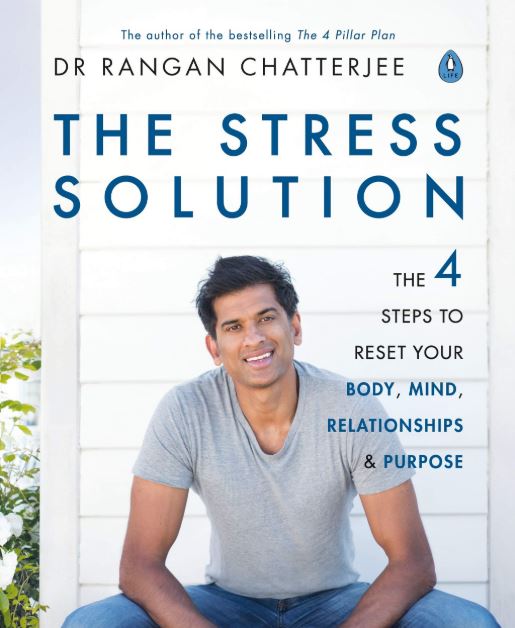Mood is on everyone’s mind this Blue Monday and in this video feature TV Doctor Rangan Chatterjee is here to help with three practical key tips to help improve your mood
‘One in four of us will experience a mental health problem in any given year,’ says Dr Rangan Chatterjee, who appeared in BBC One series Doctor In The House and has released a new book, The Stress Solution: The 4 Steps to Reset Your Body, Mind, Relationships and Purpose.
Blue Monday is said to be the most depressing day of the year. In January people tend to experience Christmas blues, the mornings and evenings are cold and dark, plus your bank balance is probably still looking slightly sorry for itself since the festive season.
Doctor Rangan Chatterjee is here to help with his top three mood-boosting tips.
Mood boosting tip #1 Have your daily dose of pleasure
‘When we don’t experience much pleasure our brain adapts and we can feel low,’ says Dr Chatterjee. ‘Why not feed your brain positive information every single day’.
In life it can be the smallest daily hassles that can cause us to feel the most low. Like missing your train, forgetting your lunch or walking into to a busy gym.
That’s because these small daily hassles build up throughout the day, and without some positive thinking, eventually they could lead to a deterioration in your mental health.
In life it can be the smallest daily hassles that can cause us to feel the most low.
A study looking at the effects on daily hassles on mood and mental health saw 50 subjects complete a daily hassles, coping and mental health questionnaires. Then two months later, the measures were taken again.
The study found that daily hassles were a significant cause of psychological symptoms. It found that the people who had experienced many daily hassles before tended to do less to improve their mood when they encountered these hassles and stressors again. This can then lead to an effect on mental health.
So by combating these daily hassles with a ‘daily dose of pleasure’, daily hassles and stressors are less likely to effect your mental health.
Dr Chatterjee says this daily does of pleasure can include watching your favourite comedian on YouTube or calling a friend to have a laugh. Remember it’s just a bad day, not a bad life.
Mood boosting tip #2 Make meditation a habit
Dr Chatterjee believes that meditation is an excellent way improve your mood. Plus getting into meditation has never been easier, with Dr Chatterjee suggesting we watch guided meditation on YouTube or download a meditation app onto our smartphones.
People no longer know how to relax, yes sitting and watching the TV can be considered relaxing but in order to truly zone out and calm down after a long day we need to slow down our breathing in a quiet space, and meditation is perfect for this.
Dr Chatterjee suggests we make meditation a daily habit
Taking just two minutes a day to breathe in a quite space can make a huge difference. Have you ever gone to sit down after a long day but your mind is still buzzing? This makes it hard to wind down after a long day.
When we are stressed, a fight or flight response is triggered in our bodies. This causes the release of various hormones, including cortisol and once the adrenaline has worn off, we will still have cortisol in our system – which is what that buzzing feeling is when we are trying to relax.
Practicing meditation just once a week may not help though, Dr Chatterjee suggests we make meditation a daily habit, even if you only complete a two minute breathing exercise.
Mood boosting tip #3 Eat the alphabet
One of the best ways to improve your gut health is to eat a ‘diverse diet’ says Dr Chatterjee. ‘I reccomend aiming to eat 26 different plant foods every single month, it’s what I call eating the alphabet.’
Many people overlook the importance of our gut health. But an optimal bacteria balance is fundamental to the functioning of the intestinal nervous system aka the gut and this can be helped enormously by eating lots of diverse vegetables.
The gut is also responsible for producing chemicals that can affect our mood, hence the term ‘gut feelings’. An example of this chemical is serotonin, where 95 per cent of which is produced in the bowels.
By feeding our gut with the right healthy foods, our gut ‘bugs’ will send calm signals to the brain lessening your chances of a low mood, anxiety or depression.
Research now shows that fermented foods such as sauerkraut, kimchi, miso and kombucha may have a positive impact on our mental health.
Our gut microbiota or flora, also known as ‘gut bugs’ communicate with our brain. This communication is known as the gut-brain-axis, and inflammation of the gut has been linked to causing mental illnesses including anxiety and depression.
By feeding our gut with the right healthy foods, our gut ‘bugs’ will send calm signals to the brain lessening your chances of a low mood, anxiety or depression. Feed them the wrong way and they will send stress signals to the brain.
Doctor Rangan Chatterjee‘s new book The Stress Solution: The 4 Steps to Reset Your Body, Mind, Relationships and Purpose is out now.
Follow Dr Rangan Chatterjee on Instagram, Twitter and Facebook.
More from Dr Chatterjee
3 things this TV Doctor wants you to know about healthy weight loss
More Healthista Content:
8 ways walking in the woods can make you happier
5 signs of abusive relationships this superstar wants you know about
How to relieve stress with hand reflexology
Like this article? Sign up to our newsletter to get more articles like this delivered straight to your inbox.






















































